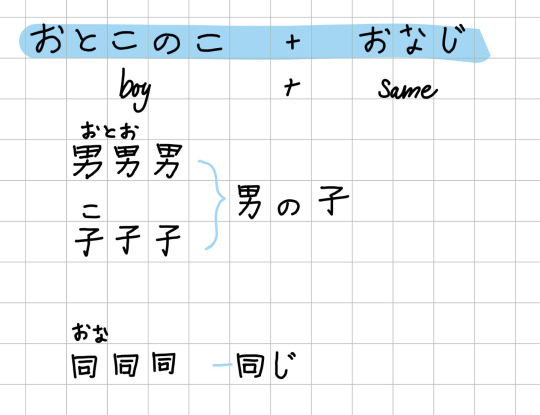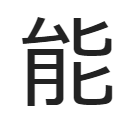#Kanji for beginners
Explore tagged Tumblr posts
Text
Learn basic Kanji for beginners
Kanji is one of the most challenging for Japanese learners because of its complex stroke orders, multiple readings and meanings. However, if you have effective method, Kanji will be an easier task.
MochiKanji is a platform applied unique method that helps you learn Kanji fast and effectively. Let's learn some common Kanji with us:

#learn kanji#kanji for beginners#how to learn kanji#best way to learn kanji#memorize kanji#kanji character#learn japanese#basic kanji for beginners
67 notes
·
View notes
Text
a fellow japanese learning friend told me there's 2 major "weed-out" learning curves to japanese, and that's 1) learning hiragana and katakana and the 2) learning kanji.
but I propose that there's a 3rd difficult learning curve and that's when you're in what I've called The Intermediate Soup where you don't have any specific thing to work on anymore but you know that you aren't There Yet
#mocha speaks#japanese langblr#learning japanese#like. you already know hiragana/katakana and know enough kanji to make it through some readings#and you can speak a little and write a little#but there's no more easily defined goalposts and the ones that exist (like going by JLPT) are still nebulous#and even beyond things like JLPT you can be N1 level and still not know a lot of things.......#anyways in the Soup you just have to make your own goals but that's hard when most resources are for people not in the Soup#(i.e. still somewhat beginner focused)
227 notes
·
View notes
Text
3 Japanese Writing Systems: Kanji, Hiragana, Katakana
In this post , you will learn on 3 Japanese writing systems. Check out my japanese products [here]. The Japanese writing system is a fascinating and complex blend of different scripts that evolved over centuries. For anyone looking to learn Japanese, understanding these scripts is essential. This post delves into the intricacies of the Japanese writing system, exploring its history, structure,…
#Effective Japanese Learning#Hiragana and Katakana Guide#japan#japanese#Japanese Language Alphabet#Japanese Language Tips#Japanese Script Differences#Japanese Writing for English Speakers#Japanese Writing System#Japanese Writing System History#kanji#Kanji Characters Explained#Katakana for Beginners#language#language-learning#Learn Hiragana#Mastering Japanese Scripts#Understanding Kanji
4 notes
·
View notes
Text
I imagine Omen doing this pose every time he asks that question

#unprepared casters#lives of the party#uc arc 5#omen haxolpenny#unprepared casters fanart#uc fanart#art#my art#digital art#beginner artist#i just realized i didn't give him his kanji/vines on his arm or the piercing thingies above his eyebrows#eh whatever drawing's done too late to change it now#also i just realized i forgot my account signature on my last two drawings oops#i'll just try to remember in the future i guess
26 notes
·
View notes
Text
6th February - 男の子+同じ
(I’m jumping into Kanji because I learnt ひりがな and かたかな last month!)
Today I put 50 more words from the JLPT N5 vocab list into a grand Quizlet so it’s now got 200 terms altogether! This is very passive study but it eases me into a session of studying. My motivation is often quite low and so I need to coach myself into studying like convincing a 5 year old to do their homework :)
I’m going to randomly generate numbers from 1- whatever number of terms I’ve got at the time in the Quizlet, and learn at least 5 kanji every day, less on a busy day. Today I had a lot of uni work to catch up on and so I only managed to learn 2. Better than nothing though !
(I use digital note taking for practice because the permanence of real paper demotivates me :( so my handwriting is better irl I swear, it’s just a little uglier on my tablet.

2 notes
·
View notes
Text
So I initially just wanted to add an "acktually, the dots mostly represent fire, not legs, and 熊 is also used to describe a big fire, isn't that neat! And please credit the Chinese language for the characters next time :D"
But my need to double check things made me dig a little deeper, and uh. That's not how it worked actually.
熊 is not 能 on legs.
能 WAS bear.

Look, a chonky fella with ears, legs and a little tail! That got stylized over the ages. Since OP has decided to skip over this not "too important" bit, I'm going to pick up slack and point at how the bear's legs became the two "匕"-s, the upper left part is the head, and the 月 radical, while meaning "moon” on its own, takes on a "flesh" vibe when it's part of a character. So the modern character is still a chonky fella with legs, but square.
What happens next is a bit blurry (since Baidu results are various levels of source: Just Trust Me), but people started using this word for “bear" to also express energy/ability and just. decided that 能 should exclusively mean that.
Using 熊 to mean "bear" has some element of chicken-and-egg-ness. Some places say that when people wanted a new bear character, they added fire under its original form to express how bears were warm, or could survive forest fires, and the "big fire" meaning came later. Others say that 熊 meant a big fire in the first place (a fire so strong it's like a bear, if you will), and when people decided they wanted 能 for themselves, the bear meaning got moved over.

From the above picture, you can tell that 熊 had some form of beastness pretty early on. The second character already shows the "能 over fire (火)" structure, and a cursory search says it existed in the hundreds of BC times.
So basically, humans invented a word for "bear", decided they didn't want to share an adjective with an animal (???like why), and lit a fire under it to chase away the original meaning. Now in modern times, 熊 can still mean a stubborn person, while another animal is used to describe impressive stuff: 牛, aka bull/cow. The animals still win.
Image source
Articles , all in Chinese
What I love about Japanese
Sometimes it’s frustrating. I’m learning it because I love anime and want to be able to engage with the culture, but all the shounen I-belive-in-my-friends inspiration can’t help you when you’re faced with a list of 1000 kanji to learn before you’re at the reading level of a five-year-old. Sometimes I wish I’d picked a language with a writing system that made sense.
But then once in a while something comes along that makes it all worth it.
Now this. This is the kanji for ability.

It’s a nice enough kanji, has some radicals of its own but isn’t too full of itself. Learning all about it isn’t too important, what you need to know is that this is the character for ability.
Now.
This.

This here is the kanji for bear. As in the animal, not the verb.
That’s right. According to the Japanese language, a bear is ability
ON LEGS
#languages#japanese#chinese#as much as I joked about it#I still don't know the ratio of amused/annoyed I should get at a post about how Japanese is so cool#and then only talks about Kanji without crediting its origin#you know like 漢字? Han (ie Chinese) words?#and ones that are still in active use in China no less#when there are many Kanji that Japanese is effectively preserving since they've fallen out of use in China#or words that Japanese has invented and passed back to Chinese eg telephone (!)#like yeah I can't get too annoyed at OP since they're probably just ignorant#and stuff like four dots = fire comes from learning Chinese as a kid#but then it goes to - so Japanese instructors and materials don't talk about this?#No mention that literally Han Words came from China?#Nothing about radicals?#Yeah children learn from rote#but are teen and adult beginner materials really not utilizing their higher cognitive ability and introducing these concepts#“the writing system doesn't make sense” my sibling in Yesu they took Chinese characters and split one language into three systems#and didn't bother telling learners about it
4K notes
·
View notes
Text
best part about learning japanese is being able to read and also eventually understand recognizeable words i hear in music or media. worst part is preparing to talk and then accidentally stuttering because i almost spoke in japanese, even though i meant to speak english which is my literal native language. my brain is stupid 😭 atleast im starting to learn but speaking can get embarrassing since im from tbe south
#nico.txt#beginner japanese#learning japanese#writing letters in hirigana is so hard with dysgraphia omfg#this is why i refuse to fully study how to write in kanji skull emoji
0 notes
Text
did an exercise in japanese class talking about what we do/don't drink and the guy behind me hit us with the わたしはトイレのみずをのみません like HUH
#i mean it's good that he DOESN'T but it's giving 4th grade class clown tbh. and i DID laugh#also yes i know there should be kanji in here but i think this captures the spirit of my baby beginner class better#he's just saying he doesn't drink toilet water. points for creativity i GUESS
1 note
·
View note
Text
Top Japanese Language Institutes in Delhi
Are you looking for a reliable and comprehensive Japanese language coaching institute in Delhi? Look no further than the Japanese language Institute in Delhi, a leading language education provider that has been helping students master the Japanese language for years.
Our Courses
At the Japanese language Institute in Delhi , we offer a range of courses to cater to different levels of proficiency and interests. Our courses are designed to be interactive, engaging, and tailored to meet the needs of our students.
Beginner's Japanese Course
Intermediate Japanese Course
Advanced Japanese Course
#japanese language learning#japanese language for beginners#japanese classes delhi#japanese kanji#kanji#japanese language
1 note
·
View note
Text

Kudamono ✨🍐🍓🍎
#digital art#artist#self taught artist#beginner artist#my artwork#digital illustration#illustration#artwork#fruits#japanese#kanji
1 note
·
View note
Text
How to learn Kanji & vocab easily?
Today we will guide you how to learn Kanji and Japanese words effectively!
31 notes
·
View notes
Text
it's poor form to air your petty grievances with someone when it comes out they did something actually bad. save that for companies, like when you learn duolingo removed kanji from its beginner's japanese courses as part of their collab with crunchy roll
24K notes
·
View notes
Text
oh no...... if it isn't the consequences of my actions.... I have class tomorrow
#damien.txt#and by tomorrow i mean today it is 12:34 am#just received all of the syllabi for all my classes. ahahahaha.#its honestly not that bad. a lot of reading but i knew that going in#for those following the saga: i ended up choosing japanese lol even tho the poll ended with way more french whoops#i unfortunately am a man at the whims of my hyperfixations. we'll see how this one turns out.#there's A Lot of work for japanese lmaoo which expected but. a little nerve wracking#i think it will. hopefully not be that hard. because this class is built for Beginner beginners and i am not. that.#like i already know hirigana + katakana + some kanji#and some extremely common use words/phrases#sooooo hopefully i wont die#overall tho i feel like it is. a reasonable amount of work. more actual tests than i was expecting tbh#like most english classes ive taken have only involved essay writing pretty much#but 2 of the ones im taking this semester have at least 1 actual test. hmm#okay i desperately need to go to sleep i have to wake up at 7 lmaoooo send help#send me luck! <3
0 notes
Text
I saw someone in the notes already mentioned WaniKani, and how you said that that's not an option for you - I'm not 100% on currency conversions in app stores, but the Kanji Study app by Chase Colburn is so good, and regularly has really solid sales on their various packs, too! It's also not subscription based, which is a massive plus in my opinion. You can check it out to see if it works for you, as the first 80 N5 kanji are available for free.
Otherwise, I'm a big fan of Basic Kanji Book - it's entirely possible you may be able to find a pdf of it out there, and with some plain gridded paper, you can easily practice the writing exercises. It's also, duh, a textbook; in comparison with (most) apps, you get tailored reading exercises to go with the kanji you've just learned.
God luck!
Hey I need your help!
So I have memorized hiragana and katakana months ago already, but I have been stuck there since then because I have no idea what I should do next. I know some random kanji that I have memorized while looking for lyrics of some of まふまふ songs, but other than that I know little kanji or vocabulary in general; therefore, even though I can read hiragana and katakana I still can't comprehend what I am reading (tried reading posts on social media, level 0 books, etc etc)
So, does anybody have a specific roadmap with specific resources or smth cause I am really stuck?
#replies#if you try it and really like BKB it continues as Advanced Kanji Book iirc!#japanese#beginner
42 notes
·
View notes
Text
Did you know that the english word “star” and the japanese word 星(ほし)don’t actually mean the same thing?
Language does not simply name pre-existing categories; categories do not exist in 'the world'
— Daniel Chandler, Semiotics for Beginners
I read this quote a few years ago, but I don’t think I truly understood it until one day, when I was looking at the wikipedia article for “star” and I thought to check the Japanese article, see if I could get some Japanese reading practice in. I was surprised to find that the article was not titled 「星」, but 「恒星」, a word I’d never seen before. I’d always learnt that 星 was the direct translation for “star” (I knew the japanese also contained meanings the english didn’t, like “dot” or “bullseye”, but I thought these were just auxiliary definitions in addition to the direct translation of “star” as in "a celestial body made of hydrogen and helium plasma").
To try and clear things up for myself, I searched japanese wikipedia for 星. It was a disambiguation page, with the main links pointing to the articles for 天体 (astronomical object) and スター(記号)(star symbol). There was no article just called 「星」.
It’s an easy difference to miss, because in everyday conversation, 星 and star are equivalent. They both describe the shining lights in the night sky. They both describe this symbol: ★. They even both describe those enormous celestial objects made of plasma.

But they are different - different enough to not share a wikipedia article. 星 is used to describe any kind of celestial body, especially if it appears shiny and bright in the night sky. “Star” can be used this way too (like Venus being called the “morning star”), but it’s generally considered inaccurate to use the word like this, whereas there is no such inaccuracy with 星. You can say “oh that’s not actually a star, it’s a planet”, but you CAN’T say 「実はそれは星ではなく惑星だよ」 (TL: that’s not actually a hoshi, it’s a planet). A planet IS a 星.
星 is a very common word, essentially equivalent to “star”, but its meaning is closer to “celestial body”. I haven’t looked into the etymology/history but it’s almost like both english and japanese started out with a simple, common word for the lights in the sky - star/星 , but as we found out more about what these lights actually were, english doubled down on using the common word for the specific scientific concept, while japanese kept the common word generic and instead came up with a new word for the more specific concept. If this is actually what happened, I’d guess that kanji probably had something to do with it - 星 as a component kanji exists inside the word for planet, 惑星, and in the word for comet, 彗星, and in the scientific word for “star”, 恒星, so it makes sense that it would indicate a more general concept when used standalone.
This discovery helped me understand that quote - categories don’t exist in the world, we are the ones who create them. I thought that the concept of “star” was something that would be consistent across all languages, but it’s not, because the concept of “star” is not pre-existing. Each language had to decide how to name each of those similar star-like concepts (the ★ symbol, hot balls of gas, twinkling lights in the sky, planets, comets, etc), and obviously not every language is going to group those concepts under the same words with the same nuance.
Knowing this, one might be tempted to say that 恒星(こうせい) is the direct translation for “star”. But this isn’t true either. In most of the contexts that the word “star” is used in english, the equivalent japanese will be simply 星. Despite the meanings not lining up exactly, 星 will still be the best translation for “star” most of the time. This is the art of translation - knowing when the particulars are less important than the vibe or feel of a word. For any word, there will never be an exact perfect translation with all the same nuances and meanings. Translation is about finding the best solution to an unsolvable problem. That's why I love it.
#translation#japanese#japanese language#learning japanese#language#langblr#language learning#semiotics#linguistics#japanese vocab#jimmy blogthong#official blog post
367 notes
·
View notes
Text
A life-changing moment
I was thinking the other day about how I came to be in Japan, and how my life could've been so very different had I not gone with my brother on the day he left for university.
You see, I had no interest in going to uni at age 16. Mostly because I was severely depressed and figured I wasn't going to make it to the end of my teens. My plans largely revolved around my band getting famous, or getting a book published, or being discovered by some acting talent scout (despite having exactly zero talent for acting) or something. I hated school and the thought of doing more school just sounded unbearable. My brother was the clever, academic one; not me. So when I went with him that morning in late September, I didn't expect anything to change.
Except I fell in love with the place. It wasn't school; it was a whole new world, with a lake and stunning architecture and gardens and people walking around in the kind of clothes I got bullied for wearing. So I did a complete 180 and decided (much to my father's despair) that I did want to go to uni after all.
While I was at uni, I made friends from all walks of life. All corners of the world. Specifically, Norway.
A couple of years later, I decided I missed being able to speak a second language (my French had been pretty good years before, but I'd forgotten most of it by that point). It was a toss-up between German, Norwegian and Finnish. German because I already knew some, had a cousin living in Cologne and figured it would be useful. Finnish because my music and pole dance idols were Finnish. Norwegian because I had a handful of friends I met at uni from Norway. I decided I wasn't that passionate about German, which left Finnish and Norwegian.
I decided on Finnish.
Went to the bookstore ready to start my journey. I went to the language section and... not a single book on Finnish. But there was a single Teach Yourself Norwegian book. And so, I picked that up instead, and thus started my Norwegian journey.
Fast forward a little and I find myself on langblr. I make lots of langblr friends and even, for a time, run a semi-popular blog. Norwegian was my one true love, of course; nothing could change that. Until someone I'd admired for years started learning Japanese. It was a language I'd always been somewhat interested in but completely adamant I could never learn because it's "too difficult". But seeing her study it made me curious. "Maybe I'll just try to learn some hiragana," I told myself.
If you've known me long enough, perhaps you'll remember that phase I went through where I completely denied I was learning Japanese. "I'll get bored of it," I kept saying. "It's fun right now because I'm in the beginner stage, but as soon as I have to put effort into it I'll give up."
And then I bought a nice notebook and a Japanese textbook and I started making flashcards and practising kanji. Oops.
Covid happened. I started teaching English online because I couldn't teach pole from home and I needed a new source of income. I liked it, but I hated being stuck behind a desk. I wanted to teach in a real classroom. I knew the possibility of getting a TEFL job in Norway was next to zero, especially with Brexit and all. But Japan...
And so I looked into it. And now I'm here.
I wonder how different my life would have been had I, on that unassuming Sunday morning in late September, opted to stay at home and play video games. Would I have ever gone to visit my brother at uni? Probably not; I didn't drive, and that's the year my mum got cancer and I got my first boyfriend, so it's not like I'd have had much inclination to go visit. And had I not seen that campus for myself, would I ever have gone to uni? Would I have made Norwegian friends? Would I have chosen to study Norwegian? Would I have stumbled upon langblr? Would I have made the same langblr friends? Would I have felt inspired to just try learning Japanese?
Maybe I would've found a different route here. Maybe I'd have found myself somewhere completely different.
It seems so silly to think that my life-changing moment was, actually, just the choice to leave the house one day. And yet.
I don't really know what I'm trying to say here, if anything at all. Perhaps all I'm trying to say is that life-changing moments don't just come up to you and punch you in the face; they're the result of long chains of actions that spiral wildly out of control, all starting from an unassuming Sunday morning when you decided to leave the house instead of rotting at home.
#chough chatterings#long post#behold: my two brain cells finally met and together they birthed nonsense#anyway i should go to bed
70 notes
·
View notes